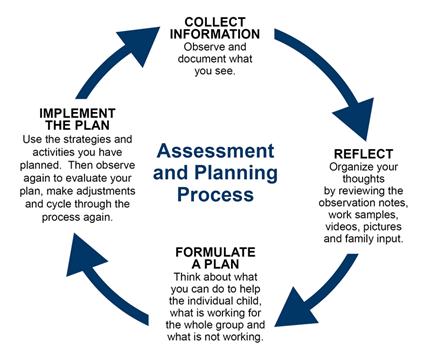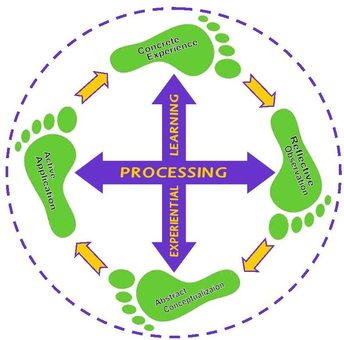
Aistear, the National Curriculum Framework defines assessment as: “….. the ongoing process of collecting, documenting, reflecting on and  using information to develop rich portraits of children as learners in order to support and enhance their future learning” There are many ways in which we assess including self-assessment, conversation, task setting, observation and testing.
using information to develop rich portraits of children as learners in order to support and enhance their future learning” There are many ways in which we assess including self-assessment, conversation, task setting, observation and testing.
Observation and assessment provides us with the information to understand children's dispositions, values and attitudes, skills, knowledge and understanding. This information can then be used to support children’s further learning and development. Assessment provides the knowledge for us to identify where children are in their learning and development by building up a picture of each individual child. Ongoing observation and assessment enables us to give to children and their parents an understanding on how they are progressing in their learning, to provide enjoyable and challenging experiences to develop that learning and to choose suitable supports, materials and experiences that interest them. This supports the development of an emergent curriculum. This emergent curriculum is a philosophy of teaching and a way of planning which focuses on being responsive to children's interests to create meaningful learning experiences. Rather than starting with a lesson plan which is based on adult ideas on activities which get the children interested, an emergent curriculum starts with the observation of the children for insight into their interests.
Assessment also enables us to provide information to parents and to involve parents in the assessment process for their child. It is important to establish that assessment should be based on what the child can do and the child interests rather that the deficits and labelling of children.
Planning is the ongoing cyclical process of thinking and organising what, why, how and when things are going to happen. Planning for children involves building on their prior learning and development and accommodating their individual differences
Assessment and Planning is linked to the following Standards and Components of Síolta, the National Quality Framework for Early Childhood Education NCCA 2006:
Standard 7: Curriculum – Components 7.5,- 7.6
Standard 8: Planning & Evaluation – Components 8.1 – 8.4
Aistear the National Curriculum Framework NCCA 2009 ; Guidelines for Good Practice provides a guideline focusing in different aspects of pedagogy which describes how the adult can support children's learning and development across four themes, one of these themes is Assessment and Planning.
Below are some links to sites and articles which provide further information in relation to Interactions .
 Planning and Assessing using Aistear’s Themes.
Planning and Assessing using Aistear’s Themes. 

Planning and Assessing is a pillar of practice in the Aistear/Siolta Practice Guide, resources include; 
Self-evaluation Tools which provide prompts to help practitioners reflect on their work on planning and assessing in order to identify successes and challenges and to note changes they would like to make.
Examples and Ideas for Practice provides examples of how different early childhood settings plan for and assess children’s learning and development
Resources for Sharing include a variety of resources to support planning and assessing. Samples are provided for different age groups
Action Planning Tools provides a template to help practitioners plan for changes in a particular area of their work in planning for and assessing children’s learning and development.
http://www.ncca.ie/en/Practice-Guide/Planning-and-Assessing-using-Aistears-Themes/